IJCRR - 13(7), April, 2021
Pages: 74-79
Date of Publication: 12-Apr-2021
Print Article
Download XML Download PDF
Impact of Task-Related Games on Cognitive Flexibility of Low-Functioning Autism Spectrum Disorder Children: A Tool for Improving Quality of Life in Indian Culture
Author: Kanwaljit Kaur, Sesadeba Pany
Category: Healthcare
Abstract:Introduction: People with autism spectrum disorder (ASD) find it difficult to fulfil the requirements of the changing environment. A lot of studies have indicated; autism spectrum disorder children lack cognitive flexibility. Objective: The present study focuses on improving cognitive flexibility through cognitive flexibility games i.e. Colour LED (light�emitting diode) board game, Geometry shape LED board game, Multidimensional LED board game, Music multidimensional LED board which initially started with minimum WM load, leads to maximum WM load on children with ASD. These games are based on four basic principles (i) providing cues (ii) positive reinforcement (iii) adaptable instructions (iv) increasing attention span through engagement. Methods: The study followed the time-series design. The study was conducted on 15 ASD children with the objectives to find (i) Do children with autism spectrum disorder (low functioning) show improvement in cognitive flexibility when exposed to task�related games? (ii) What elements of cognitive task-related games engage the children with ASD? Results: The study reported that task-based games had a significant impact on the improvement of cognitive flexibility of the ASD children; the four elements of cognitive flexibility task i.e. acceptance, variety of stimulus (LED bulb, Music), motivation and support system (providing cues when needed) plays a pivotal role in the engagement with the cognitive task-related games. Conclusion: The study recommends that task-related games can be used to develop cognitive flexibility in low-functioning Autism Spectrum Disorder Children.
Keywords: Autism Spectrum disorder, Cognitive flexibility, Colour LED board game, Engagement, Geometry shape LED board game, Multidimensional LED board game, Music multidimensional LED board, Working Memory
Full Text:
INTRODUCTION
Restricted, repetitive behaviour and interests, social and communicative problems dominate in autism spectrum disorder children.1 ASD is a type of neurodevelopmental disorder and children with ASD deficits in executive functioning,2 especially cognitive flexibility. ASD children show a deficit in restricted and repetitive behaviour, which is related to the impairment of cognitive flexibility.3 Till now there is no conclusive research on interventions for ASD children, still many studies indicate that individuals with ASD perform better on computerized interventions than on face to face administered tasks,4-6 but still, no conclusive data is available for both types of tasks.7 Studies on cognitive flexibility in ASD are not only inconsistent but contradictory.8 This inconsistency in result, might be due to the heterogeneity in ASD, the high level of degree comorbidity i.e. ASD with ADHD, and the overlapping in different domain of executive function i.e. working memory, inhibition, planning & organization.4,9
People with ASD find it difficult to fulfil the requirements to the changing environment, for instance, if the place of bed is changed in the room it might make them restless. However, some studies have found that cognitive flexibility deficits in ASD children.3,10-12 while others do not find any deficit.13,14 To measure cognitive flexibility among ASD children tools are used, such as the Wisconsin Card Sorting Task (WCST), Trail Making Test (TMT), or Dellis-Kaplan executive function system (D-KEFS) colour-word task; hybrid neuropsychological/experimental measures, such as the intra-dimensional/extra-dimensional (ID/ED) set shift task (Cambridge Cognition 1996), experimental task-switch paradigms, for instance, switch tasks.8,9 Children with ASD reflect deficit on the WCST15,16 and the D-KEFS colour-word task.7
Geurts et al.8 found that the failure to detect cognitive flexibility deficits in ASD is due to the predictability of the cognitive flexibility measures (such as switch tasks). Other alternative explanations are that many of the studies focus on minimizing and maximizing the WM load by varying the stimuli from simple to complex i.e. Simple geometry figure,3-D figure and3,7,11,17 and providing task cue continuously.18 The present study focuses on improving cognitive flexibility through games that initially started with minimum WM load, leads to maximum WM load to children with ASD. In this paper following questions are addressed;
-
Do children with autism spectrum disorder (low functioning) show improvement in cognitive flexibility when exposed to task-related games?
-
What elements of cognitive task-related games engage the children with ASD?
MATERIALS AND METHODS
Participant
The participants were selected from Darpan academy, which is a special school for autistic children. Family members of the ASD children were contacted through the school teachers and administrators. 44 children were screened through (a) Clinical ASD diagnosis tool (Diagnostic and Statistical Manual of Mental Disorders-V) used by experienced psychiatric and psychologist in Dayanand Medical College (DMC), Ludhiana, Punjab (b) Age group 5-12 years, (c) IQ below 85. IQ was tested with Wechsler Intelligence Scale for Children (WISC-III: Kort et al.,2002; Sattler, 2001). Out of 44, eighteen children were excluded, after their screening (student’s diagnosis not confirmed n=6; age=7; students IQ Criteria does not meet, n=2; personal reasons, n=3). Seven children dropped out during the experimentation process due to their reasons. Finally, 15 potential children were selected by using inclusion criteria, for task-related games. Four children did not complete 23 cognitive sessions. three children used medication during the whole experimentation process.
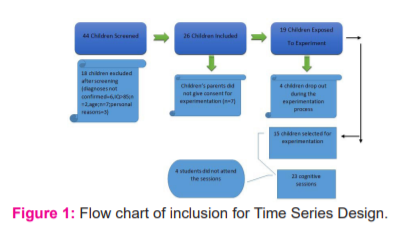
Pilot Test of Cognitive Flexibility Intervention
Executive function performance-based test (EFPT) is meant to assess the executive function of Autistic Spectrum Disorder (ASD) children. The test consists of four major activities and each activity has two sub-activities. These activities are based on four major components i.e. working memory, inhibition, planning and organization, and cognitive flexibility. The task-related games were initially piloted with 10 students of ASD in Uddhan School for Special Children in Jalandhar, Punjab. The participants selected were between 5-10 years old. The purpose was to confirm if the interventions are appropriate to the target and to find out, what type of problem they are facing i.e. in pushing the switch, identifying the colour of the toys
Intervention
Intervention Description
It is an individualized task where the teacher gives instructions and the child has to follow to execute the task. Different colours (Red, Green and Blue) and different shapes (Triangle, rectangle, circles and hexagonal) are inserted on the wooden board which emits different colours when switched on (attach vertically below to LED strips).
Procedure
Colour LED board game
The participant is exposed to a wooden board, attached with the LED's (Light-emitting diodes) strips of different colours (Red, Green and Blue). First, the teacher shows them red, blue and green simple toys (i.e. Red, green and blue bucket) so the child could recall the primary colours. Then the investigator picks a toy out of a bucket and asks the participant to match the colour of the toy with the strips on the board if required cues are provided to the child. If the participant, push the correct button then he/she is rewarded, on emerging the same colour light (as the teacher instructed to match). The teacher’s instruction changes, if answered correctly by the participant (by matching the bucket colour with the one on board) as shown in figure 1.
Geometry LED board game
In this game, the participant is exposed to the wooden board, inscribed with the three triangles (made by using LED) of different colours (Red, Green and Blue).In this task, the teacher points a particular colour triangle i.e. red triangle (place nearby wooden block) and asks the participant to match that colour of the triangle with the wooden colour triangle (the emerging colour comes from LED stripes). The Illuminated colour of LED helps the participant to enhance the attention span and engagement in the task. The teacher will change the instructions if the answer is correct as shown in figure 2.
Multidimensional LED board game
A wooden board was inscribed with different shapes (triangle, circle and rectangle) made by using LED strips. The teacher points to different shapes and asks the participant to put the desired shape on the target (wooden block), in such a way that both shapes symmetrical to each other. When congruence exists between the desired and with the target shape lights emits, which reflect the symmetry between the target and wooden shape as shown in figure 3. The teacher changes the instruction according to the adaptability of the participant.
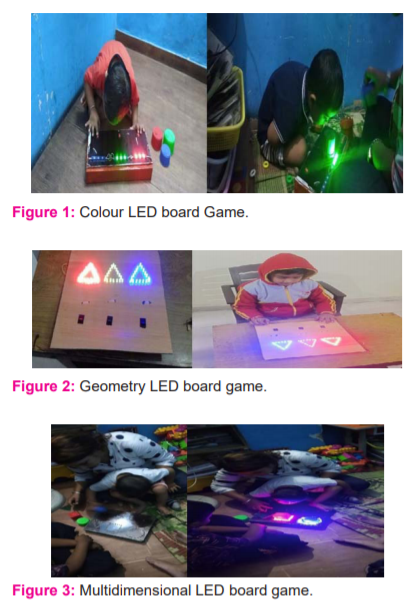
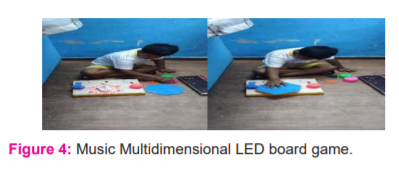
Music Multidimensional LED board game
A wooden block with different shapes (Circle, Rectangle and Hexagonal) was made by using LED strips along with a bird’s voice box. The teacher points towards the different shapes (desired shape place nearby wooden block) and asks the participant to put the desired shape on the target shape (shape designated on the wooden block), in such a way that both shapes symmetrical to each other as congruence exists between the desired and target shape by the participants light and birds voice are emerging as shown in figure 4. The teacher changes the instructions according to the adaptability of the participant.
Procedure
The study followed the time series design due to the inconsistent nature of ASD children which is difficult to generalize just only from the one test and the non-availability of children in good number to form two groups. In the present study, a single group consisting of 11 ASD category children, were taken as the subjects of the experiment. These ASD children were given intervention on task-related games. Before the treatment, they were exposed to repeated (three times) pre-tests on executive function on the dependent variables. The reason behind such repeated pre-tests was that the ASD category children’s social skills, as well as their activities either mental or behavioural, are quite inconsistent and through one pre-test it will be highly unrealistic to draw any conclusion regarding the dependent variables of the study. They were also repeatedly (three times) post-tested with the same dependent variable.
RESULTS
-
Quantitative Analysis
Research Question 1. Do children with ASD (low functioning) show improvement in cognitive flexibility when exposed to task-related games?
The Means and Standard Deviation for the experimental group are presented in Table 1. The subjects of the experimental group were subjected to the cognitive flexibility test as per the time-series design and the mean values of both the pre and post-test are found to be 5.88 and 10.36 respectively. Further, when the scores were subjected to the testing of their level of significance the t ratio was reported to be 2.437 which is significant at a 0.05 level of significance (Figure 5). This result indicates that after exposure to the task-related games the ASD child showed significantly better cognitive flexibility as compared to before exposure.
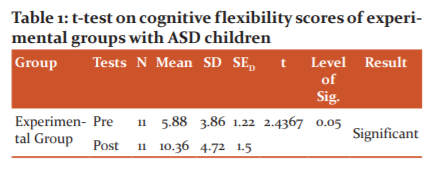
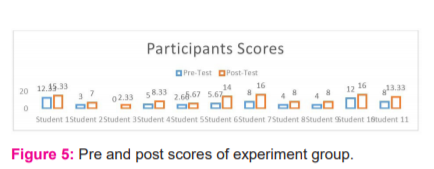
As earlier mentioned out of the 15 ASD children four children dropped out due to their reasons just after the pre-test and joined the group after the intervention and participated in the post-test process. As such their pre-test and post-test measures are given in table 2. In the case of the drop out ASD children, the cognitive flexibility scores were also calculated and it was observed that the pre and post-test mean scores as 2.6 and 3.3 respectively with the t ratio of 1.3 i.e. not significant (Figure 6). It indicates that the exposure of ASD children to task-related games substantially improves their cognitive flexibility.
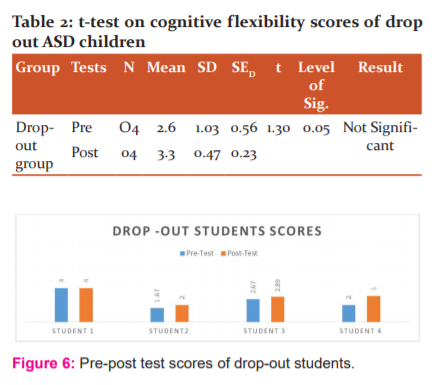
-
Comparison of Experimental Group with Drop-Out Group
Table 3 reveals the difference between the experimental group and the drop out group. The current study shows a large effect size (0.81). It means the score of the average person in the experiment group is 0.8 standard deviation above the average person in the drop out-group and hence exceeds the score of 79% of the drop out-group. The scores varied for the two groups (Experimental Group-M=10.36, SD=4.72; Drop out Group-M=3.32, SD=0.47). At an alpha of .05, the analysis indicated a statistically significant difference among the group t =2.90 and effect size=0.81. So, we confidently (at 0.05 level) conclude that task-related games help in the improvement of cognitive flexibility among autism spectrum disorder children.
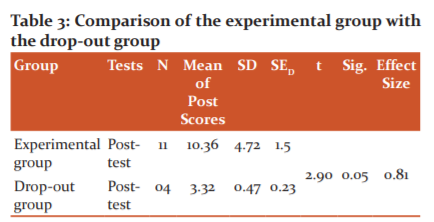
Qualitative Analysis
Research Question 2. What elements of cognitive task-related games engage the children with ASD?
The above questions can be answered through an individual case study which discussed in detail (appendix-1). Engagement is an external measure that could be estimated by observing patterns of execution of the task. From the case studies (shown in Appendix-1), it was found that five prominent elements responsible for engaging in cognitive flexibility task and building the relationship with the ASD children are: (1) Acceptance (2) Variety of Stimulus (LED bulb, Music) (3) Motivation (4) Support system (providing cues when needed) (5) individualized instructions (Figure 7).
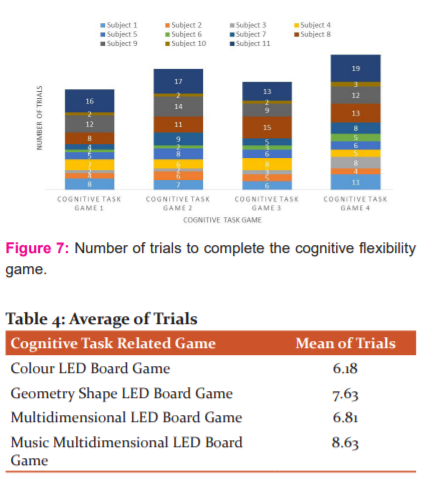
Children with ASD completed the games on average six to nine trials (as shown in table 4). These games completed by the children in the small number of trials that show participant pay attention to these games during the experiment which helps them to build effective interaction with the investigator as well with games.
DISCUSSION
The study aimed to improve the cognitive flexibility among the low functioning ASD children who reported a deficit in everyday life situations.8 In the present study, the performance of 11 ASD children was compared with drop-out students who were not exposed to the intervention due to their reasons. They were compared on basis of performance on the task mentioned in the executive function performance-based test. The task-related games based on two principles i.e. (1) Minimal Working Memory Load (2) Unpredictable and complex stimulus i.e. Different geometric shapes (difficulty level increased as proceed from game 1 to 4). This study, addressed two questions first, task-related games improve cognitive flexibility. Second, what is the pattern of behaviour of ASD student when exposed to the task-related game? Through quantitative analysis, by using a t-test it was found that there is a significant change in cognitive flexibility of ASD children as compared to those ASD children who did not get the intervention and the same trend was also observed through the case studies i.e. qualitative results. The present findings synchronized with the study findings of Kenworthy et al.4 There are at least five reasons for the positive current findings.
Firstly, the Cognitive flexibility based task used in this study, unpredictable with continuous cues presented by the teacher with effective interaction. Secondly, task-related games not entirely focus on cognitive flexibility but also the far effects i.e. attention span, inhibition. Thirdly, this study focused on the individual differences approach which depicted in the variation of instructions according to the attributes of the child i.e. visual, audio with variation in the pitch. Fourth, children exposed to multiple games elements which motivated the child and increase the attention rates which may improve the training effect. Fifth, overall improvement might be due to output measure through performance task not to be measured through observation in daily life activities.
Conclusion
The current study indicates that the cognitive flexibility of low functioning ASD children can be improved through task-related interventions including certain factors like unpredictable stimuli, effective interaction, indirect cues (LED lights, bird voice), individual differences approach, a variety of games and output measures. This study found limited evidence for the far effect. The present study can also be extended to the population of ADHD and comorbid ASD children.
Acknowledgement. The authors acknowledge the immense help received from the scholars whose articles are cited and included in the references of the manuscript. The authors are also grateful to the authors/editors. Publishers of all those articles and journals from where the literature for this article has been reviewed and discussed
Conflict of Interest: The authors declare no conflict of interest associated with this work
Source of funding: There is no external funding agency associated with this article
Ethical clearance: The study was approved by the departmental institutional ethics committee of CUPB ( CUPB/EDU/20-21/141).
References:
1. Anbarasi L, Prassanna J, Sarobin V, Rajarajeswari S, Prabhakaran R, Manikandan R. Autistic Disorder Analysis Among Children and Adult. Int J Curr Res Rev. 2020;12 (21):48-51.
2. Manggai TM, Manoj J, Muhammad Ehsan R. Analysis of Autistic Spectrum Disorder Screening Data for Adolescents. Int J Curr Res Rev 2020;12(19):23-30.
3. Yerys BE, Wallace GL, Harrison B, Celano MJ, Giedd JN, Kenworthy LE. Set-shifting in children with autism spectrum disorders: reversal shifting deficits on the Interdimensional/Extradimensional Shift Test correlate with repetitive behaviours. Autism 2009;13(5):523-538.
4. Kenworthy L, Yerys BE, Anthony LG, Wallace GL. Understanding executive control in autism spectrum disorders in the lab and in the real world. Neuropsychol Rev 2008;18(4):320-338.
5. Benyakorn S, Calub CA, Riley SJ, Schneider A, Iosif AM, Solomon M, Hessl D, Schweitzer JB. Computerized Cognitive Training in children with autism and intellectual disabilities: feasibility and satisfaction study. JMIR Mental Health 2018;5(2):e40.
6. Almeida TS, Lamb ME, Weisblatt EJ. Effects of delay, question type, and socioemotional support on episodic memory retrieval by children with autism spectrum disorder. J Autism Dev Disord 201949(3):1111-1130.
7. Van Eylen L, Boets B, Steyaert J, Evers K, Wagemans J, Noens I. Cognitive flexibility in autism spectrum disorder: Explaining the inconsistencies? Res Autism Spectr Disord 2011;5(4):1390-1401.
8. Geurts HM, Corbett B, Solomon M. The paradox of cognitive flexibility in autism. Trends Cogn Sci 2009;13(2):74-82.
9. Monsell S. Task switching. Trends Cogn Sci 2003;7(3):134-40.
10. Hughes C, Russell J, Robbins TW. Evidence for executive dysfunction in autism. Neuropsychologia 1994;32(4):477-492.
11. Reed P, McCarthy J. Cross-modal attention-switching is impaired in autism spectrum disorders. J Autism Dev Disord 2012;42(6):947-953.
12. Reed P, Watts H, Truzoli R. Flexibility in young people with autism spectrum disorders on a card sort task. Autism 2013;17(2):162-171.
13. Corbett BA, Constantine LJ, Hendren R, Rocke D, Ozonoff S. Examining executive functioning in children with autism spectrum disorder, attention deficit hyperactivity disorder and typical development. Psychiatry Res 2009;166(2-3):210-222.
14. Goldberg MC, Mostofsky SH, Cutting LE, Mahone EM, Astor BC, Denckla MB, et al. Subtle executive impairment in children with autism and children with ADHD. J Autism Dev Disord 2005;35(3):279-293.
15. Gillberg IC, Billstedt E, Wentz E, Anckarsäter H, Råstam M, Gillberg C. Attention, executive functions, and mentalizing in anorexia nervosa eighteen years after onset of eating disorder. J Clin Exp Neuropsychol 2010;32(4):358-365.
16. Liss M, Fein D, Allen D, Dunn M, Feinstein C, Morris R, Waterhouse L, Rapin I. Executive functioning in high-functioning children with autism. J Child Psychol Psychiatry Allied Disc 2001;42(2):261-270.
17. Robinson S, Goddard L, Dritschel B, Wisley M, Howlin P. Executive functions in children with autism spectrum disorders. Brain Cogn 2009;71(3):362-368.
18. Schmitz N, Rubia K, Daly E, Smith A, Williams S, Murphy DG. Neural correlates of executive function in autistic spectrum disorders. Biol Psychia 2006;59(1):7-16.
|






 This work is licensed under a Creative Commons Attribution-NonCommercial 4.0 International License
This work is licensed under a Creative Commons Attribution-NonCommercial 4.0 International License